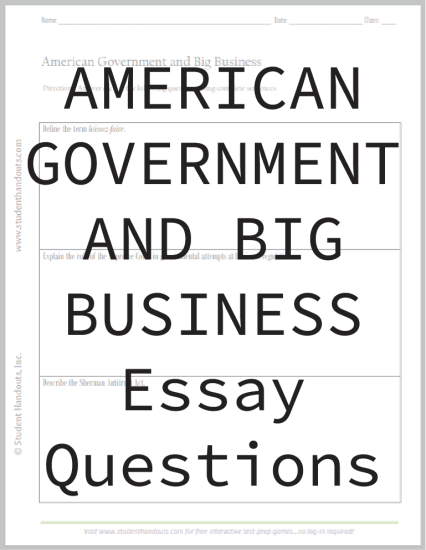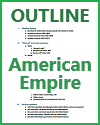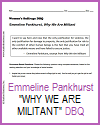This free printable worksheet contains three essay questions on American business and government at the turn of the previous century.
Questions:
(1) Define the term laissez-faire.
(2) Explain the role of the Supreme Court in governmental attempts at business regulation.
(3) Describe the Sherman Antitrust Act.
Click here to print. Answers will vary.
The Sherman Antitrust Act is a significant piece of U.S. federal legislation aimed at promoting fair competition and preventing monopolistic practices in business. It was enacted in 1890 and is named after its sponsor, Senator John Sherman. The Sherman Antitrust Act consists of two main sections:
- Section 1 prohibits contracts, combinations, and conspiracies that restrain trade or commerce among the states. It outlaws agreements that limit competition or unfairly suppress competitors in various industries.
- Section 2 makes it illegal to monopolize or attempt to monopolize trade or commerce among the states. This section targets businesses or individuals that gain excessive control over a market or industry, limiting competition and harming consumers.
Key points and features of the Sherman Antitrust Act:
- The Act marked the first attempt by the U.S. government to regulate and control monopolistic practices in business.
- It was a response to the rapid growth of powerful corporations and trusts in the late 19th century, which were seen as having too much economic and political influence.
- The Act's language is intentionally broad, making it applicable to a wide range of anticompetitive behaviors.
- Violations of the Sherman Antitrust Act can result in both criminal and civil penalties.
- Enforcement of the Act primarily falls under the jurisdiction of the Federal Trade commission (FTC) and the Department of Justice (DOJ).
- The Act has been used in various high-profile cases to break up monopolies and address anticompetitive practices. One notable example is the breakup of Standard Oil in 1911.
- Over the years, the Act has undergone legal interpretation through court decisions, and various amendments and additional antitrust laws have been enacted to further regulate business practices.
The Sherman Antitrust Act serves as a foundational piece of antitrust legislation in the United States and continues to play a significant role in maintaining competitive markets, preventing anticompetitive behavior, and protecting consumer interests. It is part of a broader framework of antitrust laws aimed at promoting fair competition and preventing monopolies.
|



















































